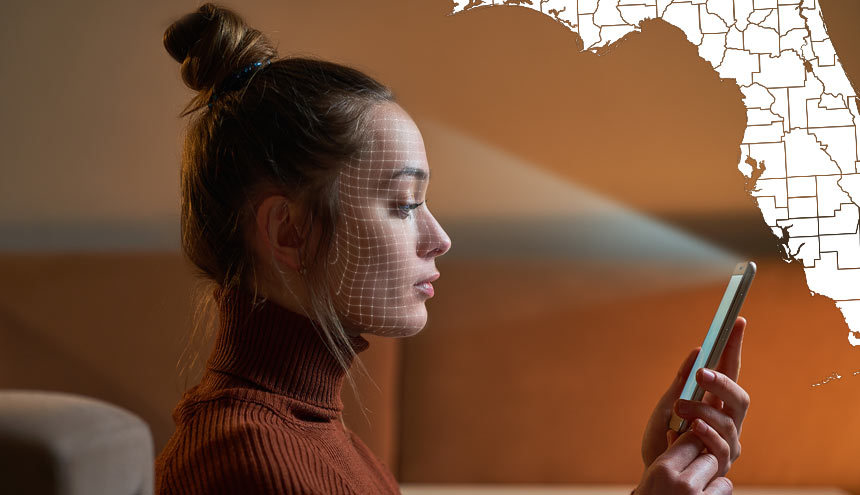Cyberspace (February 4, 2026) - Corey D. Silverstein, the driving force behind MyAdultAttorney.com and Adult.Law,…

Urgent Compliance
The landscape for the adult entertainment industry operating in Florida has changed from one of legal uncertainty to one of immediate, high-stakes compliance. Following the enactment of the state’s age verification law (HB 3) on January 1, 2025, Florida Attorney General James Uthmeier has launched an aggressive enforcement campaign, filing multiple complaints against major online platforms and their affiliates for openly defying the law.
The clear message from the Attorney General’s office is that the time for passive observation is over. Any commercial entity that publishes or distributes material “harmful to minors” — defined as a “substantial portion” (more than 33.3%) of their content — must act now to implement a robust, legally compliant age-verification system or face severe financial and legal consequences.
Featured In The November 2025 Edition Of XBIZ World

The Enforcement Threat is Real and Immediate
Attorney General Uthmeier has not only announced lawsuits but has targeted some of the world’s most-trafficked adult websites.
“Multiple porn companies are flagrantly breaking Florida’s age verification law by exposing children to harmful, explicit content,” Attorney General Uthmeier stated. “We are taking them to court to make sure they cannot continue bypassing Florida’s common-sense safeguards.”
The stakes are immense. Violations of Florida’s age-verification law carry civil penalties of up to $50,000 per violation. Considering these sites attract millions of users in Florida monthly, the potential for massive fines in a single lawsuit is staggering. Furthermore, the complaints filed by the AG’s office seek to not only impose civil penalties but also permanently enjoin (block) non-compliant sites from operating in the state, and to award attorney’s fees and costs.
Targeting Channel Partners: The Broad Reach of the Law
A critical takeaway from the recent legal filings is the Attorney General’s broad interpretation of who is liable under the new law. The lawsuits are not just naming the main website operators but are also going after related corporate entities and what appear to be channel partners and payment processing services.
For example, complaints have been filed against companies identified as operating major “tube” sites, including those owned by the Aylo Group, as well as a separate complaint targeting third-party providers. The inclusion of third-party providers suggests that content distributors, and other commercial channel partners who facilitate access to the non-compliant material can also be held liable for failure to ensure age verification.
This enforcement strategy sends a chilling warning throughout the entire adult content supply chain: every business that profits from the distribution of “material harmful to minors” in Florida is now on the hook for compliance. Content creators, website owners, and the third-party services that support them must ensure their compliance obligations are met, even if they are one step removed from the user interface.
Florida’s Unique Restrictions on Anonymous Age Verification Providers
Florida’s House Bill 3 (HB 3) introduces a unique provision that applies specifically to anonymous age verification systems. The law prohibits a foreign-owned company from providing or operating an anonymous age verification method for websites distributing material harmful to minors. Standard age verification providers are not subject to this ownership restriction.
Although adult sites must offer users both a “standard” and an “anonymous” verification option, the law technically permits these to be operated by different vendors. In practice, however, most entities will likely rely on a single integrated system for operational simplicity.
This requirement, which effectively mandates a U.S.-based or non-foreign-owned age verification provider, is a distinct and critical feature of the Florida law.
- Geopolitical and Security Rationale: The intent behind this restriction is likely rooted in concerns over data security and foreign influence. By requiring a U.S.-based provider, the legislature presumably aims to ensure that the highly sensitive personal identifying information (PII) collected during the verification process — such as scanned government IDs or biometric data — remains within the country and is subject to U.S. legal and privacy standards.
- Impact on Compliance: For online commercial entities, this provision narrows the field of potential third-party age verification vendors. It adds another layer of due diligence to the compliance process, as they must not only select a “reasonable” and privacy-preserving method but also confirm the domestic ownership structure of the service provider.
- Distinction from Other State Laws: While many state age verification laws have been criticized for the privacy risks associated with collecting sensitive PII, Florida’s added requirement shifts the focus onto the national origin of the data custodian, a distinction not commonly found in the similar legislation passed in states like Louisiana or Texas.
The Clear Trajectory: Increased Enforcement is the New Standard
Based on the actions and public statements from the Attorney General’s office, the reasonable expectation is that the state will not only continue pursuing these types of actions but will significantly increase the quantity of enforcement actions in the coming months and years.
This expectation is grounded in several key indicators:
- Pattern of Litigation: Attorney General James Uthmeier has already filed multiple, separate complaints against a growing list of companies since the law took effect on January 1, 2025. These lawsuits have targeted major international adult content distributors, as well as specific third party services and affiliates, demonstrating a widening net of accountability.
- Explicit Intent: Public statements from the AG’s office have consistently conveyed a determined, zero-tolerance stance. For example, the AG has stated, “We are taking them to court to make sure they cannot continue bypassing Florida’s common-sense safeguards,” and that they are fighting those “willfully preying on the innocence of children for their financial gain.” This rhetoric indicates a sustained commitment to aggressive enforcement.
- Violation Frequency and Penalties: The lawsuits explicitly contend that non-compliant websites are racking up “tens, if not hundreds, of thousands of violations” every day, as each access by a minor could be considered a separate infraction subject to the $50,000 per violation penalty. The staggering potential for fines provides a powerful incentive for the state to pursue as many non-compliant entities as possible.
- Strategic Focus on the Supply Chain: The inclusion of third-party service providers in the complaints confirms a strategic focus on dismantling the financial and distribution networks that support non-compliant sites. This is a highly effective, force-multiplying enforcement strategy that logically requires more lawsuits against different parts of the adult content supply chain.
- National Context: Florida’s actions are part of a broader, national trend, and a favorable outcome for the state in any of its pending cases would only embolden the AG to further ramp up enforcement against what is a massive online industry.
In short, the lawsuits filed to date should be seen not as an end, but as the initial volley in a comprehensive, ongoing campaign to compel compliance with HB 3 across all facets of the adult content industry operating in Florida.
What the Industry Must Do to Comply
Florida Statute mandates that covered commercial entities must use a method to “verify that the age of a person attempting to access the material is 18 years of age or older and prevent access to the material by a person younger than 18 years of age.”
Covered entities must offer both a standard and an anonymous method of verifying age — the latter designed to preserve user privacy by avoiding collection of personally identifying information.
The law requires offering users a choice between two methods of verification:
- Standard Age Verification: Defined as any commercially reasonable method approved by the commercial entity. This commonly includes:
- Uploading a government-issued ID.
- Use of third-party age verification providers that match user data (name, date of birth) against government or commercially available databases.
- Anonymous Age Verification: A method that does not require collecting or retaining personal identifying information, as detailed in a separate section of the statute.
Immediate Action Checklist for All Adult Entertainment Businesses:
- Implement a Robust, Dual-Method Age Verification System: Clicking a simple “I am 18” button is explicitly non-compliant and is the exact failure being targeted in the AG’s lawsuits. Engage a reputable third-party age verification vendor that can offer both a standard and an anonymous age verification method to Florida users.
- Verify Provider Nationality: For the anonymous age verification method, the provider must be U.S.-based or non-foreign-owned to satisfy HB 3’s requirements. Standard age verification providers are not subject to this ownership restriction but must use commercially reasonable, privacy-conscious methods.
- Audit Your Content: Determine if “more than 33.3 percent” of your content meets the “harmful to minors” definition. If it does, you are covered by the law. If your business model involves publishing or distributing adult content, you should assume the law applies to you.
- Assess Partner Liability (Channel Partners/Tube Sites): If you are a content creator, ensure the platforms you upload to are verifiably compliant. If you are a third-party service provider, advertiser, or content delivery network, you must determine your exposure. The AG is aggressively tracing the money and distribution chain. You must either cease service to non-compliant clients operating in Florida or require them to demonstrate proof of compliance.
- Review Data Privacy Protocols: The law includes strict privacy rules for anonymous age verification providers, prohibiting them from retaining or using data for any purpose other than immediate verification. However, the statute does not expressly extend these same data retention limits to standard age verification providers — an omission that may reflect a legislative oversight rather than intent. As a best practice, all AV providers should follow equivalent privacy and data minimization principles.
- Prepare for Legal Action: Given the current enforcement climate and the certainty of increased actions, any commercial entity serving the Florida adult content market without a verifiable, legally sound age gate is at risk of receiving a civil complaint or injunction. Legal counsel should be on retainer to review compliance measures and prepare a defense strategy.
Florida’s enforcement actions signify a major shift. The message from the state is unambiguous: comply with the age verification mandate — including its unique U.S.-ownership restriction on anonymous verification providers — or face devastating legal and financial consequences. For the adult entertainment industry, compliance is no longer optional; it is a mandatory cost of doing business.
This article does not constitute legal advice and is provided for your information only and should not be relied upon in lieu of consultation with legal advisors in your own jurisdiction. It may not be current as the laws in this area change frequently. Transmission of the information contained in this article is not intended to create, and the receipt does not constitute, an attorney-client relationship between sender and receiver.
About Silverstein Legal
Founded in 2006 by adult entertainment lawyer Corey D. Silverstein, Silverstein Legal is a boutique law firm that caters to the needs of anyone working in the adult entertainment industry. Silverstein Legal’s clients include hosting companies, affiliate programs, content producers, processors, designers, developers, and website operators.




